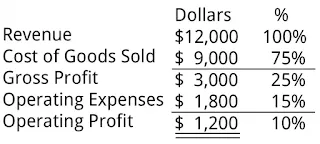Operating Profit: How To Calculate Operating Income
Operating profit or operating income is a company's profit gotten from its core business activity. It is calculated before deducting interest and taxes.
It is one of the key profitability in accounting for a business person because it shows the revenue and expenses that a business can directly control, manage and predict on. You can easily find out what your company’s operating profit is and track it.
Operating profit doesn't include earnings that are not directly related to the main activity of a firm. These earnings are:
- Income from investments.
- Capital gains on asset sales.
- Rental income.
- Bank account interest.
- Miscellaneous earnings (e.g dividends).
Operating profit serves as an indicator of a business’ profit-making potential. It is highly accurate because it doesn’t include any external variable factors.
It is one of the key factors that investors look at when choosing a business to invest in. For them, if your company is experiencing a decline in its operating profit, it means that there is less money for its expansion in future.
Formula for operating income
Operating Profit formula = Revenue from Core Operations – Cost of Goods Sold – Operating Expenses – Depreciation – Amortization
What Is Included in Operating Income?
Operating Revenue is the income from a company’s main business activity. This also means sales.
Cost of Goods Sold (COGS) or cost of sales is the money spent on producing the products the firm sells, e.g costs of the materials and labour. It doesn’t include expenses like distribution or sales costs.
Operating Expenses is the money which the company spent on rent, marketing, administration, payroll, etc.
Depreciation on the other hand is the decrease in the economic value of a company's assets over time.
How To Calculate Operating Income
Michael own a company Donald's Burgers Ltd. Let’s examine his company’s income statements:
- Revenue: £2,000,000
- Interest earned: £50,000
- Earnings from 30% stake in ITT Ltd: £800,000
- COGS: £1,000,000
- Labour: £400,000
- Administrative & marketing expenses: £50,000
Points 2 and 3 are not considered when calculating Donald's Burgers Ltd operating profit because 2 is earnings from an interest bank account and 3 is the return on investing in another firm — both 2 and 3 have no connection to the company’s operations.
Let’s apply the formula:
£2,000,000 (Operating Revenue) − £1,000,000 − £400,000 (COGS) − £50,000 (Operating expenses) = £550,000
Therefore, Donald's Burgers Ltd operating profit is £550,000.
Are EBIT and Operating Income the Same?
Operating profit can be used as a synonym for “Earnings Before Interest and Taxes (EBIT)”, but only if the company has no expenses unrelated to the main business activity, e.g. costs from currency exchange.
Earnings Before Interest and Tax (EBIT) is the business’s net income from the operations without taking into account the tax and capital structure of the business. It is often considered synonymous with operating income, although there are differences.
Some businesses include non-operating expenses and other income that the company generates in EBIT. However, while calculating operating income, only the income from operations is accounted for. Also, operating income is an official (Generally Acceptable Accounting Principle) GAAP measure while EBIT is not.
Also Read












